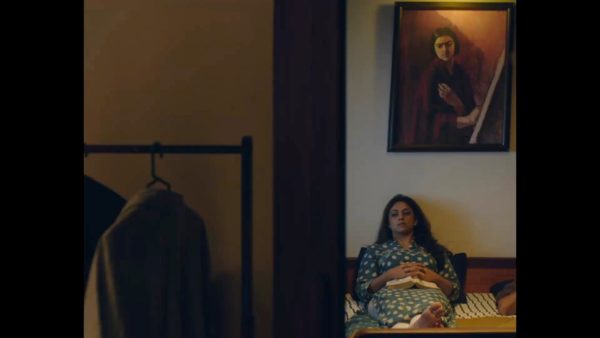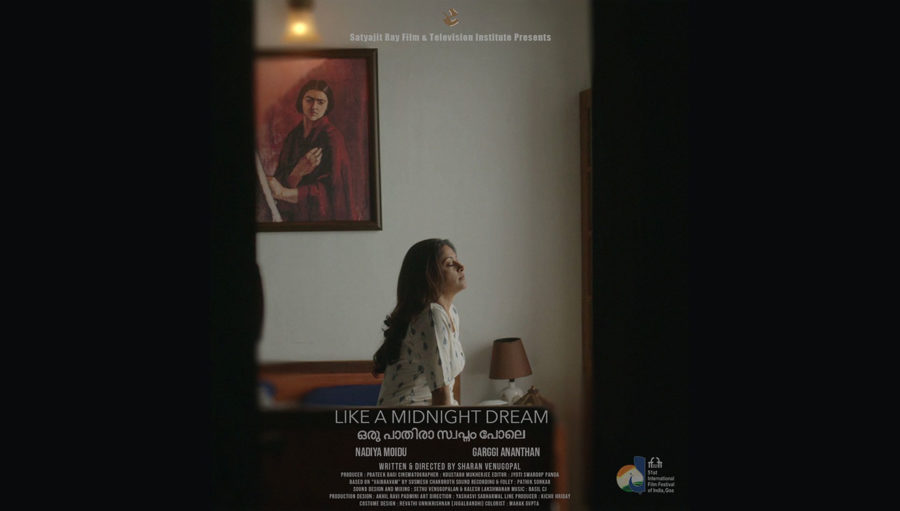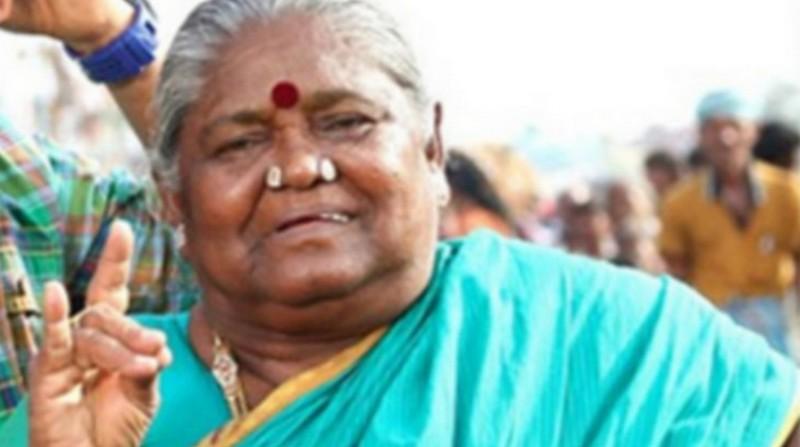Oru Paathiraa Swapnam Pole (Like a Midnight Dream), the Malayalam short film which won the Best Film with Family Values award under the non-feature film category at the 67th National Film Awards on Monday, explores the concept of personal space and privacy.
In a conversation with Silverscreen India, the film’s writer and director Sharan Venugopal shares how the main character of the 37-minute-long film was inspired by his own habit of setting rigid boundaries and overthinking nature.
View this post on Instagram
Oru Paathiraa Swapnam Pole stars Nadiya Moidu as the protagonist and explores a mother-daughter relationship. The story is set against the backdrop of Kochi and is about how a mother (Nadiya) chances upon a nude selfie video of her teenage daughter (Garggi Ananthan) in the latter’s laptop. The rest of the film follows the mother’s dilemma between confronting her daughter about the video and invading the personal space/privacy of an individual.
Sharan says that the mother’s struggle in confronting her daughter stems from his own personality.
“Personally, I am someone who has very rigid boundaries. I am not someone who shares everything with people around me. I find it difficult to confront things when something is inside my mind. I overthink a lot, exactly like the character does in the film,” he says.
Calling personal space a “grey area”, Sharan explains that with the advent of social media and easy accessibility to internet, the idea of privacy has changed.
“That is where the thought started from. I wanted to explore where personal spaces start and end, the space of ourselves and explore it,” he says.
The film was Sharan’s diploma project of his post-graduation in direction and screenplay writing course at the Satyajit Ray Film and Television Institute in Kolkata in 2019. The film was sent for the National Film Awards by the institute towards the beginning of 2020.
He says that the basic idea of the project arose from a short story titled Vaibhavam, written by known Malayalam writer Susmesh Chandroth.
“I made a few changes from the short story, so it served as an inspiration rather than a complete adaptation,” Sharan says.

Sharan began writing the script in early 2018. Seven months and several drafts later, his final draft was ready. The film’s pre-production began in late 2018 and was shot in 2019 in Kerala’s Fort Kochi.
Interestingly, while the story includes a father, it passes the Bechdel test. The Bechdel test is a measure of representation of women in fiction, which asks whether a work of fiction has at least two female characters who talk to each other about anything other than a man.
The filmmaker says that he “tried to avoid the male gaze” while writing the film.
Recommended
“While watching some films made by male filmmakers, it becomes quite evident that a man has made the film. This is true especially of mainstream cinema. One should be empathetic and sensitive towards characters, irrespective of gender. It is a very sad thing that we don’t have female representation in the filmmaking industry. I think what helped me while writing the script and later while shooting the film was really observing the women who are part of my life and their interpersonal relationships,” he says.
“I like to explore the realm of interpersonal relationships and what it means to us. I find the little conflicts that we have in daily lives with people around us beautiful. It is a huge part of our lives,” the 28-year-old filmmaker says.
While Sharan feels that Indian parents do not respect their children’s personal space, he says that the backdrop against which the characters are placed plays a crucial role. Placing the family in an urban and touristy place, like Fort Kochi, enabled the mother to be more liberal and respectful of an individual’s personal space, he says.
“It is important for me to place these characters in an upper middle class, urban society. To make them have a liberal outlook, like where the parents have an inter-faith marriage and the father has a Leftist political outlook. Ideally, the mother gives her daughter a lot of freedom and she is not a person who, under normal circumstances would not check her daughter’s laptop. This puts her in a dilemma where she knows that it is something personal to her daughter but as a concerned mother, she thinks it could be a video that could be misused. That eats up her mind,” Sharan explains.

The film is peppered with feminist visual cues- Amrita Sher-Gil’s portrait of a woman, images of Audrey Hepburn plastered on a wall, and the mammography that a character goes through.
While Sharan says that they were not intentional, he says, “The one thing that was intentional was the painting. Amrita Sher-Gil has inspired me and this portrait connected to me. I felt it strong and thought it should be there.”
The filmmaker says that he intended to make the “narrative as effective as possible” with a “slice of a life” story. “The first shot of the film looks very vast, but once you track it back, it occurs to be small. Even the issues, in our lives, are like that. We overthink and make things complex in our minds. But when you take a couple of steps back, it may look small and resolvable.”
Sharan says that it was a conscious decision to have an open ending in the climax.

He says that he was skeptical about the 37-minute run time of the film, doubting if the film would find a place at film festivals.
Talking about the casting, Sharan says that since he wrote the script from the mother’s perspective, he felt that the artist should have the “charisma” or “aura” that the person should carry.
“While writing, I stumbled across an interview of Nadiya ma’am and that is when I thought of casting her. I gave her a call with the script and she liked it, but for the daughter’s role, I conducted auditions,” Sharan says.
Oru Paathiraa Swapnam Pole was screened this year at the Indian Panorama Section at the 51st International Film Festival of India, Goa.
Sharan says he has completed the script for his next venture- a full-length feature film and is currently pitching it to producers.



